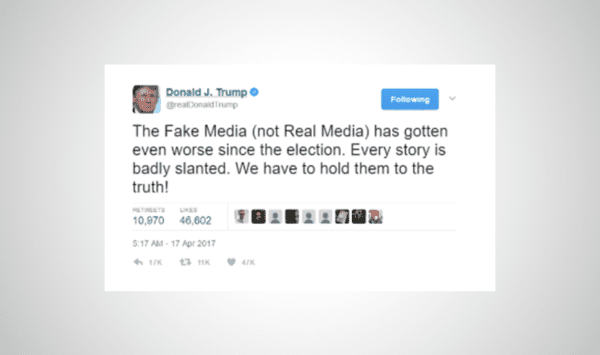
Exposure to the phrase “fake news” might matter more than exposure to fake news itself.
Since the 2016 presidential election, there has been a lot of talk about fake news. News organizations and politicians alike have adopted the terms “real news” and “fake news” to describe the current media environment. The most notable usage of the terminology has come from President Trump via Twitter, but as the Washington Post and BBC have pointed out, former presidential candidate Hillary Clinton actually used “fake news” in a speech given in December 2016. President Trump subsequently used the term to describe media coverage, in addition to distinguishing so-called fake outlets from otherwise “real media.”
While politicians on both sides of the aisle have used the terminology of fake and real news, media organizations themselves are also perpetuating the use of these terms to combat negative perceptions. The Wall Street Journal even developed a campaign to differentiate itself as a real news organization that could be trusted. Their inclination to do so was warranted.
When people are asked what comes to mind when they hear the word “news,” many report thinking of the words “fake” or “biased.”
There is evidence that this language is, in fact, affecting people’s perceptions of the news. For example, in a forthcoming study by the Center for Media Engagement, researchers found that when people are asked what comes to mind when they hear the word “news,” many report thinking of the words “fake” or “biased.” Although research suggests that fake news might not be powerful enough to swing votes or affect the 2016 election outcome, a poll from the Harvard Kennedy School Institute of Politics showed that Americans certainly believe that it is common. The 18-29-year-old segment, in particular, believe fake news constitutes 48.5% of their Facebook feed, on average.
All of this to say that people are talking about fake news and believe that it’s out there. But does simply talking about fake news matter? Does talk about fake news influence a person’s ability to discern what’s true in the news and what’s not? We explore these questions in our paper recently published in the journal of Mass Communication and Society.
We hypothesized that repeatedly hearing and seeing the term “fake news” would affect how people see and evaluate the news. We conducted an experiment with 391 Americans using Amazon’s Mechanical Turk (mTurk) platform. We showed study participants a series of tweets from fictional journalists, activists, and politicians (i.e. elites). People were exposed to tweets either about the federal budget or about fake news. These tweets worked to prime participants to think about fake news (or not). This was important for the second part of the study in which participants were asked to identify news articles as real or as fake. Individuals were presented with either 3 fake articles, proven to be 100% false by Snopes.com, or 3 real articles that had been pulled from either the New York Times or the Wall Street Journal. They were asked, “Do you think this article is real or fake news, or are you not sure?”
Key Findings
Here’s what we found:
- Seeing elites talk about fake news leads people to be less accurate in identifying real (but not fake) news.
Individuals who were shown tweets from elite sources about fake news more often reported that real news was fake or that they were unsure compared to those who only saw tweets about the federal budget. - Seeing elites talk about fake news decreases people’s trust in media.
Individuals who were shown tweets about fake news reported significantly lower levels of trust in news media than those who were shown tweets about the federal budget - Political ideology doesn’t explain these differences.
It’s not just a partisanship problem. Conservative participants were not any more likely to identify real news as fake than moderates or liberals, just as liberal participants were not any more likely to identify real news as fake than moderates or conservatives.
Taken together, our results suggest that the prominence of fake news in elite discourse is problematic for democracy.
To recap, elite discourse about fake news (1) reduces trust in media, (2) negatively affects people’s ability to identify what is real news, and (3) isn’t just the by-product of political ideology. Taken together, our results suggest that the prominence of fake news in elite discourse is problematic for democracy. These findings paint a more extreme picture of media skepticism than previous research has observed by showing that exposure to accusations of “fake news” may impede one’s ability to identify truth or reality, a phenomenon we refer to in our recently published paper as “media nihilism.”
These findings run contrary to some research that suggests that fake news isn’t a big deal. The results are in line with work that places great importance on how we choose to refer to this type of mis/disinformation. For example, some researchers, like Dr. Claire Wardle of First Draft News, refuse to say f*** news, and others, like Dr. Kathleen Hall Jamieson at The University of Pennsylvania, opt to instead label it as viral deception, or VD.
There is considerably more work to be done on this topic. Future avenues of research should explore how accurate individuals are at identifying fake news shared via social media, how individuals discuss and define fake news, and the extent to which the topic of the fake news stories influences people’s reactions.
For now, our research suggests that even if the impacts of reading fake news are minimal, there are problems with simply hearing people talk about it. In other words, we should stop saying fake news.


